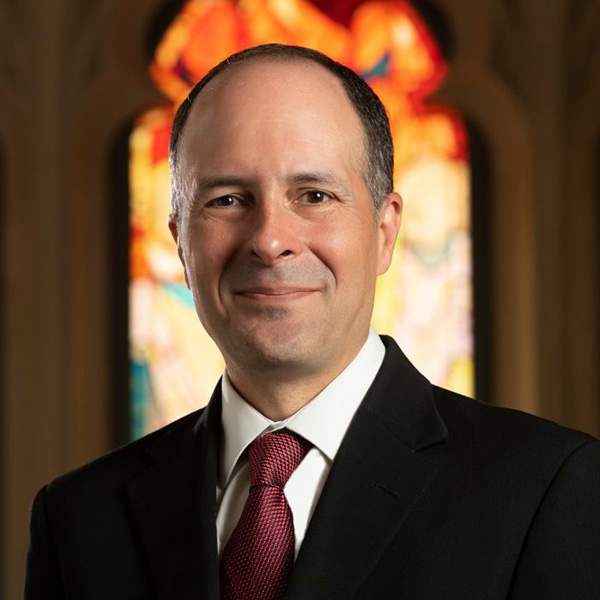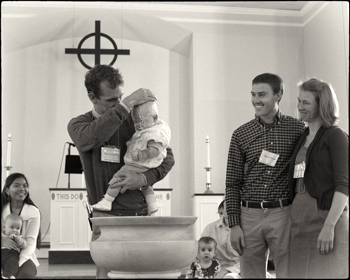Editor’s note: Faith & Leadership offers sermons that shed light on issues of Christian leadership. The following is adapted from a sermon preached at the Duke Youth Academy in Goodson Chapel on June 25, 2018.
Deuteronomy 6, Acts 4, Galatians 3, Psalm 119
I’ve been asked to speak to you about the important matter of baptism as ordained by our Lord Jesus Christ, and I will begin with a quick foray into the culinary world.
Who can tell me what this type of food processing is? Here is its Wikipedia description: “the process of preserving or expanding the lifespan of food by either anaerobic fermentation in brine or immersion in vinegar.”
It is pickling. And how many of you enjoy eating a pickle? Personally, it took me a long while after coming to the United States before I warmed up to the taste of a pickle. I think I was not sure about this notion of replacing the light sweetness of a fresh cucumber with the blaring sourness of vinegar.
But that’s very odd, because I happily eat kimchi, which is also sour. So maybe it’s the spice in kimchi that helps to diffuse that pain of the sourness. But maybe subconsciously I was also thinking, “Ugh, this is so American, this taste.” Maybe. I do not know. But, praise the Lord, the taste of pickle began to make its way into my taste inventory. My appreciation for the taste of a pickle began to grow.
So why do I start with this verb, “to pickle”? Why enter into the culinary world? It is because to baptize is to pickle. To pickle is to baptize. The Greek word for our English verb “baptize” is baptizo. For the longest time, translators had the hardest time figuring out what baptizo meant. So, for example, what does it mean when Jesus commissioned us to disciple the nations and then to baptizo them in the name of the Father, the Son and the Holy Spirit?
The search for the meaning of baptizo came to a fruitful end through an archeological discovery of a recipe. It was made known that baptizo means to immerse the ingredient in a solution -- which we now understand as pickling. To be baptized means to not simply dip the ingredient into the solution but to continuously immerse the ingredient in the solution so that the ingredient is transformed.
Today, we generally understand baptism to be an immersion term. We understand it in terms of the ceremony in which we physically immerse ourselves in water to symbolically show how we are soaked through in the life of Jesus Christ; we go under the water, and that symbolizes our burial of our old selves in sin, and then as we come out of the water, we say that this is the rise of our new selves in Christ.
We also understand baptism as an immersion term in our day-to-day, year-after-year living, in which we have conscious and continuous fellowship with our Lord, immersing ourselves in his word and in his work and being transformed into Christ’s likeness in the process.
Yet we are also to understand baptism as an allegiance term. For the Christian, baptism is made complete when it is a baptism in the name of God the Father, the Son and the Holy Spirit. Because what Jesus commanded is not [just] baptism but baptism in the name of God the Father, Son and Holy Spirit.
So baptism is also an allegiance term. This is a strong way of understanding that was held on to by the early Christians.
When we say “in the name of,” it’s not just a formula of words to be mouthed during the physical baptism, but it’s an actual avocation. It’s calling our soul to now be conscious of the name of God. To evoke God’s name is to evoke his total worthiness and absolute sovereignty and power.
This baptism that Jesus called us to is fundamentally a call for allegiance. It is fundamentally a decisive commitment of our lives to God, who is of supreme sovereignty and majestic might.
When Jesus says we are to be baptized in the name of God the Father, the Son and the Holy Spirit, it in fact recalls the Old Testament call to worship. For example, in Deuteronomy 6, we are told that this is the call to worship: “Hear, O Israel: The Lord our God, the Lord is one. Love the Lord your God with all your heart and with all your soul and with all your strength” (Deuteronomy 6:4-5 NIV).
The New Testament disciples understood that Jesus’ name has power. To call out in the name of Jesus is to call upon the authority and the might of the Lord. So in Acts 4, the disciples would say, “Salvation is found in no one else, for there is no other name under heaven given to mankind by which we must be saved” (Acts 4:12).
And in the same way, the disciples would perform a miracle. For example, Peter would say, “Silver or gold I do not have, but what I do have I give you. In the name of Jesus Christ of Nazareth, walk” (Acts 3:6).
He does not say just “walk”; the phrase “in the name of Jesus Christ of Nazareth” is a calling to awareness that this is divine work, this is the work of God, this is a miracle, this is by supernatural intervention. And so to say that I am now baptized in the name of God is to say that I am now sworn to full allegiance and loyalty and submission to this God, who is sovereign and who is mighty.
When the first Christians were baptized in the name of God the Father, Son and Holy Spirit, they were not only performing this tangible public ritual of deep spiritual meaning that speaks of their death and resurrection with Christ; they were not only confessing that their conversion is for live transformation in knowing God’s word and doing God’s work; they were making a declaration of allegiance.
They were saying, “My life is yours, Jesus Christ. You are the true Son of God, not the Roman Caesar” -- who was back then a self-declared son of God. All allegiance was supposed to be given to the Roman emperor. But here the first-century Christians were saying, “I hereby make known before all of you who are witnessing that my full allegiance is to Jesus Christ and not to Caesar, that Jesus and not Caesar is my Christ, the truly anointed one of God.”
And for such an allegiance, the first Christians were marginalized, tormented and certainly brutally killed, because they had declared this solemn life-or-death decision. And for this life-or-death decision, they’d have a change of address, that they would no longer perish but they would live in eternity, knowing the loveliness of God.
It is not merely a renouncement of the old ways of sin and wickedness, but when we say we are baptized in the name of God, we are saying that this is also an announcement to embrace the holy ways of God and obedience. It’s to say that the King has spoken; “your wish is my command; your command is my delight; I will do as you say.” After all, Jesus prefaced the command to baptize with, “All authority in heaven and on earth has been given to me” (Matthew 28:18).
So baptism is an immersion term, an allegiance term, that we have now understood from a culinary discovery, and we take it to be our life term.
The apostle Paul wrote to the Galatian churches -- this is recorded in Galatians 3: “So in Christ Jesus you are all children of God through faith, for all of you who were baptized into Christ have clothed yourselves with Christ” (Galatians 3:26-27).
The Galatian Christians were in a spiritual turmoil when the apostle Paul wrote to them. Specifically, they were struggling in their confidence as Christ’s little Christs. They were unsure that placing their faith in Christ was enough, especially when they were taught by certain false teachers that they must become more Jewish in their practice, in their physical features, before they could fully become God’s people. And so the apostle Paul reminded them that all they needed was Christ himself, to be baptized into Jesus Christ.
No doubt, they had been through the ceremony and they had been going through a life transformation, because the apostle Paul said to them, “You were running a good race” (Galatians 5:7) -- that their obedience to Christ was growing.
And so the Galatian Christians should be secure in their status as children of God, because they have been through this ceremony. It’s not just a claim, but it is also an expression of their faith, and it shows that their life is transforming and that at the same time they have a change in their allegiance with their commitment.
Because for these Galatian Christians, it is a challenging change in allegiance. They are Roman citizens. They enjoy the privileges of Roman citizenship and the prosperity of the Roman Empire, and now they’re persecuted. Now they are being marginalized, and they may even face the probability of torture in the future.
This is a challenging allegiance, and yet they have made this change in allegiance to say, “Christ, you are my Lord.”
So with all of that, it should have been enough for them to affirm their faith in Christ, that Christ alone was enough. But much of their insecurity and confusion had come from forgetting their baptism into Jesus, forgetting that they were already in obedience to all that Jesus had commanded -- which certainly did not include that they become more Jewish by circumcising themselves. That was not what Jesus taught, and that wasn’t the obedience that was called for.
The obedience was a call to go and follow all that Jesus had taught through the disciples and now proclaimed. And so the apostle Paul told the Galatian churches that they were clothed in Christ.
This was to remind them of their Roman practice, of how they were changing from childhood into adulthood, how they were shedding their old selves -- now you’re the new you, and this new you is the you in Christ. Their identity and their destiny were already secure in Jesus; Jesus alone was to be their security and their life. Jesus was their covering that marked their transition from being God’s enemies to God’s children.
Perhaps if [this situation in] Galatians were to happen today, they would put out hashtags -- #christislife, #christismylife, #christgivesmelife, #christismynewlook. So it must be for each of us who call on Jesus as our Lord and Savior, that the assurance that we are all children of God through faith in his Son Jesus, that this faith is expressed in our baptism into Christ, that this faith is expressed or understood as our being dressed in Christ -- #christismyonlymusthaveforallseasons.
It is an immersion and allegiance that will transform us to say with more and more conviction, just as we’ve read that the psalmist declared, “Teach me, Lord, the way of your decrees, that I may follow it to the end. Give me understanding, so that I may keep your law and obey it with all my heart. Direct me in the path of your commands, for there I find delight. Turn my heart toward your statutes and not toward selfish gain. Turn my eyes away from worthless things; preserve my life according to your word” (Psalm 119:33-37).
Baptism is an immersion, an allegiance that will transform us to know with more and more conviction that great is the grace that has been given to us sinners when Jesus died on a cross and rose from the grave. Just as Paul wrote to the Roman church, “Don’t you know that all of us who were baptized into Christ Jesus were baptized into his death?
“We were therefore buried with him through baptism into death in order that, just as Christ was raised from the dead through the glory of the Father, we too may live a new life. For if we have been united with him in a death like his, we will certainly also be united with him in a resurrection like his. … In the same way, count yourselves dead to sin but alive to God in Christ Jesus” (Romans 6:3-5, 11).
I was physically baptized in 1994, and so that was a milestone in my life. But after that, I went through a few years of being baptized into the world. Rather than keeping to this oath of allegiance to my Lord, even as God patiently walked with me, I went through a time that I was more of a fleshly pickle than a godly pickle.
The intentional life of immersion and allegiance did not happen for a few more years after 1994, but thank the Lord I’m learning to taste that the Lord is sweet, that he is good. And in the same way that God acknowledged Jesus Christ when he was baptized -- “You are my Son, whom I love; with you I am well pleased” (Mark 1:11) -- I’m learning what it means that I’m united with Christ. Therefore, in the same way, you and I, when we’re united in Christ, we too will be graciously received as children of God. This union with Christ should allow us to hear God say, “You are my child, my son and daughter.”
My brothers and sisters in Christ, the bloody cross affirms the merciful cleansing of our sins in Jesus. The empty tomb affirms the generous distillment of this new life we have in Christ, and the occupied throne affirms the provision and protection that God graciously gives to all who are baptized into Jesus. And the occupied throne calls for us to trust and obey the one who loves us and has given himself for us.
The bloody cross, the empty tomb and the occupied throne all call for us to be continuously pickled in Jesus. Are we pickled in the word and work of Jesus? Are we preserved by Scripture, or do we find ourselves immersed in the death pull of what the psalmist called “worthless things”?
Who and what are the things that are the true kings of our hearts? In our daily life, it makes a huge difference, when we wake up in the morning, when we walk into life asking, “What will life be if Christ is enthroned? What will I do with my Instagram post? What might I say in anger when I’m playing League of Legends? What will I do on the field if I’m a student athlete? How will I express my art if I am an artist?”
It makes a difference when we think and we are conscious that the Lord is King.
And it’s also important for us to be aware that even in the good Christian disciplines, we sometimes make that our king rather than the King himself. For example, when we are serving, it can be that we end up being passionate for the work of God without the passion for the God of the work. It is possible that when we are hand-lettering those verses and putting them out there to encourage one another, we are so immersed in the artiness of it that we have not enjoyed the God who has given us the ability to be artistic, the ability to appreciate and create such beauty.
The more we are pickled in Christ, on the one hand, we’ll know Jesus more and more, we’ll live in greater likeness of him, we will trust and obey him whom we have come to love more and more. Our allegiance will grow. It will strengthen.
Yet at the same time, we’ll be so baptized into Christ that we will also see sin and evil for what they are. We will see idols and idolatry for what they are. And because we have tasted the goodness of Jesus Christ, then sin and idols will be as vomit and diarrhea to us.
I pray that you will have a blessed pickling in Jesus Christ. May he be our one and only.











